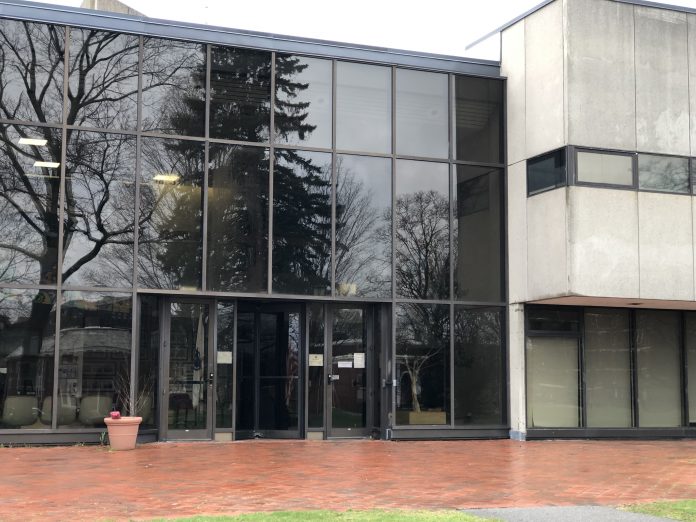By Geena Monahan—For the North Star Reporter
A Bylaw Subcommittee meeting to discuss a tax abatement for the abandoned property at 35 Robinson Ave. turned into a broader conversation on how to bring defunct buildings back on the tax rolls.
“From an administrative perspective, we are getting zero dollars in taxes and revenue currently…,” said Town Manager Michael Borg about the site at the Oct. 2 meeting. “It is a blighted property. It is an eyesore. It has contamination. It has the attention of the Massachusetts Department of Environmental Protection. Any time a developer comes in we are very supportive, with the caveat that the town isn’t going to bring large amounts of money to fix any problems.”
Located behind Dyer Lake Funeral Home, the former jewelry factory built in the 1800s, now stands condemned on contaminated soil. According to Borg, an interested developer has a purchase-and-sale agreement and is asking the town to provide an abatement of back taxes and interest owed.
Currently, $182,318 is owed on the property, with more than $91,000 of that being interest.
Under Massachusetts General Laws Chapter 58, Section 8C, and Chapter 59, Section 59A, approval of a brownfield redevelopment local-option bylaw would allow the town to make agreements regarding payment of outstanding real estate taxes, interest and penalties.
All three subcommittee members — Ryan Benharris, Dan Donovan and Laura Wagner — voted unanimously to pass a measure that would allow 100% of interest and 75% of the principal owed to be abated, should the property become affordable housing. It will now go before the Town Council for final approval.
Borg said this measure could apply to any brownfield site in North Attleborough and spark additional redevelopment of blighted properties.
“Is this a done deal? No,” said Borg. “But there could be other contaminated properties that this could help.”
The abandoned mill site on Broadway Street, the property across the street from Stop and Shop on Route 1 and the Courtois property on Mendon Road were examples given by Borg of brownfield sites in town that could be revitalized through the passage of this measure.
The proposed buyer for the Robinson Avenue site is listed as American Environmental Building Coalition Corp., a nonprofit organization “committed to restoring contaminated and distressed properties with a focus on creating workforce and affordable housing for low-and-middle-income families.” Darius Gregory, who formerly served on Town Council, is listed as the founder of AEBCC.
The property is currently under contract with plans to develop it into a five-story residential development with 80 to 100 units and an open-air parking garage. Between 20 and 25% of the units would be classified as affordable, with the remainder being market-rate.
Such a development would require the zoning be changed from residential to commercial-industrial by the Zoning Board of Appeals.
The property has had past issues with teenagers entering and falling through floorboards. Wagner voiced her support for the tax abatement if it led to cleaning up a site that could be leaking and further contaminating surrounding soil.
“I’m in 100% agreement; it concerns me to have brownfields,” said Wagner. “It’s not a beautiful place—it’s an eyesore. It’s a blight, and those things are a magnet to kids. It could collapse at any time.”
Donovan, chair of the Bylaw Subcommittee, said a major goal of the Town Council has been to be business-friendly and support new businesses that want to come to town.
“We’re not in a rush to failure,” said Borg. “Let’s take our time to do our due diligence and grow the town smarter.”

